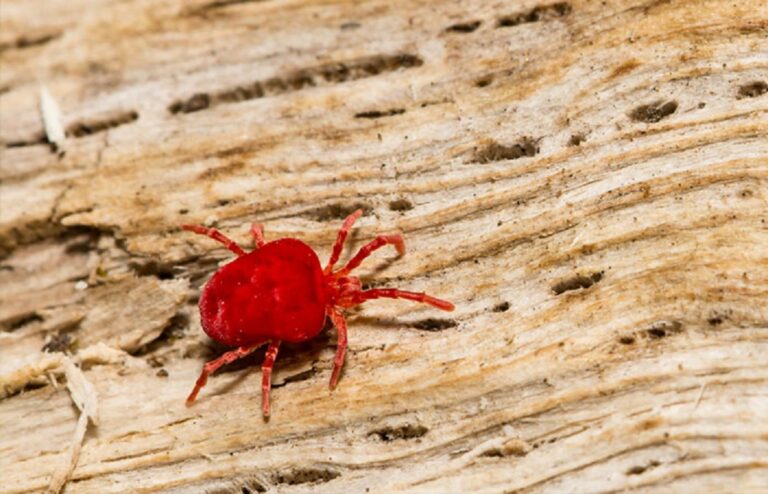
Chiggers are little mites found outside in woodland or grassy regions close to water. They stick to your clothing and bite your skin as they prefer warm climates, especially in the summer.
Chigger bites typically occur close to the seams of tight-fitting clothing and irritate the biting site. The family of mites known as chiggers (Trombiculidae) includes species closely related to ticks and spiders. Since they are so tiny, chiggers are practically invisible to the naked eye.
Chigger larvae feed on the skin tissue of a host (human or animal) after emerging from their eggs (larvae), after which they fall off and develop into adult mites. Chiggers are a type of outdoor plant-eating insect that is common around the world and generally found near bodies of water. When the weather is warm in the summer, they are most active.
Who Do Chigger Bites Affect?
Chigger bites can affect anyone who comes into contact with chiggers in their natural habitat. They typically bite exposed areas of skin, such as the ankles, waist, and armpits.
Chigger bites are more common in warm and humid environments, and they tend to be more prevalent during the summer and fall seasons. Children, outdoor enthusiasts, hikers, and gardeners are generally at a higher risk of getting chigger bites as they spend more time in areas where chiggers are present.
However, chigger bites are not dangerous and do not transmit diseases, but they can cause severe inflammation and discomfort, which can last for many days.
Chiggers adhere to your clothing where your skin and clothing are in close contact, such as at waistbands, bra lines, and sock lines, or where your skin folds.
Areas where chiggers frequently bite include:
- Ankles.
- Lower legs.
- Behind your knees.
- Waist.
- Groin.
What Are the Signs of Chigger Bites?
Chigger bites are painful red spots resembling little hives, pimples, or blisters. Typically, they are located in warm skin folds, around the ankles, or the waist. With time, they get bigger and itchier and frequently manifest in bunches.
Within a few hours of the chigger sticking to the skin, chigger bites begin to itch. The red bumps heal over 1-2 weeks, and the itching stops after a few days.
How Are Chigger Bites Treated?
Chiggers don’t spread diseases, in contrast to ticks and mosquitoes. They are just unpleasant, not destructive.
Chigger bites are typically treatable at home:
- To get rid of any chiggers still adhering to the skin, scrub chigger bites well with soap and water.
- It may be calming to place a cool towel over the bites.
- Anti-itch lotions and calamine lotions can assist with itching.
Itching may occasionally be relieved by oral antihistamines (allergy medications), especially if your kid has problems falling asleep at night.
Encourage children not to scratch their bites, as this can result in cellulitis, an area of escalating redness, swelling, discomfort, and warmth.
Fingernails kept short might lessen the risk of skin irritation from scratching. If an infection of the skin does occur, antibiotics might be required.
How Do Chigger Bites Affect My Body?
Chigger bites can cause itching, redness, and bumps on the skin. They attach themselves to the skin of humans and animals and feed on skin cells.
When a chigger bites, it injects saliva into the skin that contains enzymes that break down skin cells. This results in an intense itching sensation and forms small, red bumps on the skin. These bites are most commonly found around areas of the body where the skin is thin, such as the ankles, waist, and armpits.
Chigger bites are not dangerous and do not transmit any diseases. However, they can be extremely uncomfortable and can lead to secondary infections if the bites are scratched too much.
Home Remedies to Treat Chigger Bites
Chigger bites can be very uncomfortable, but fortunately, there are several home remedies you can try to alleviate the itching and discomfort. Here are some suggestions:
- Wash the affected area with soap and water as soon as possible to remove any remaining chiggers.
- Apply a cold compress to the bite area for 10-15 minutes. This can significantly reduce discomfort and itching.
- Apply calamine lotion or hydrocortisone cream to the affected area to help reduce itching and swelling.
- Take an antihistamine such as Benadryl to help reduce itching and swelling.
- Apply a paste made from baking soda and water to the bite area. This can help reduce itching and irritation.
- Apply a slice of fresh onion to the bite area for 10-15 minutes. Doing so can help alleviate the symptoms.
It is important to note that chigger bites can sometimes become infected, so if you notice signs of infection, such as increased pain, redness, or drainage, you should see your healthcare provider and seek medical attention immediately.
Conclusion
Chigger bites can cause inconvenience for people who have been exposed to them. Although they do not produce a significant health risk, they can cause discomfort and itching, which can lead to scratching and potential infection. Therefore, people should take preventive measures, such as wearing protective clothing and using insect repellent when they visit areas where chiggers might be present.
If bitten, there are several home remedies and over-the-counter treatments available to ease up the symptoms. However, it is recommended to seek medical help if the bites become infected or if symptoms persist. With proper care and treatment, chigger bites can be managed, allowing people to continue enjoying their outdoor activities without fear of any irritation or discomfort.